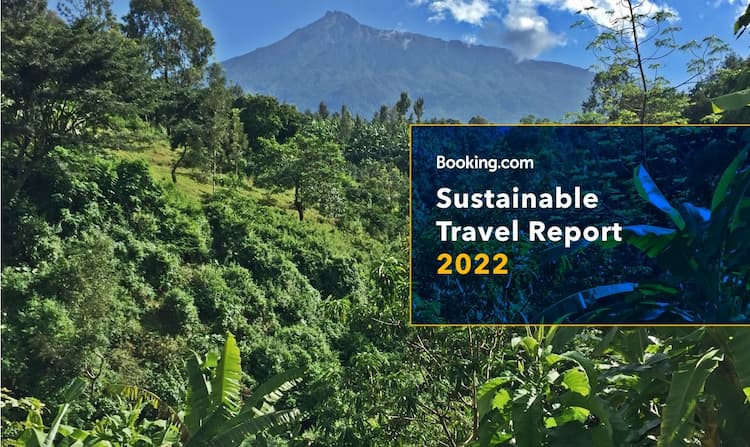Booking.com Reveals the Trends Shaping Sustainable Travel in 2022
• 81% of global travelers confirm that sustainable travel is important to them, with 50% saying that recent news about climate change has influenced them to make more sustainable travel choices
• 57% of travelers would feel better staying in a particular accommodation if they knew it had a sustainble certification
• More than 100,000 properties globally are now being recognized for their sustainability efforts with a Travel Sustainable badge on Booking.com

According to the findings, awareness and visibility of more sustainable stays continues, with 40% of global travelers confirming they have seen a sustainable accommodation on an online travel site over the past year and 38% indicating that they actively look for information on the sustainability efforts of a property before they book. 46% of global travelers reported having stayed in sustainable accommodation over the past year. Of those who have experienced a more sustainable stay in the past 12 months, the reasons for selecting one vary:
● 41% said they chose it to help reduce their impact on the environment
● A third (33%) wanted to have a more locally relevant experience
● 31% believe sustainable properties treat the community better
Alternative destinations and timing
There is consensus amongst travelers on wanting to avoid busy and over-visited destinations, with a third (33%) saying that they chose to travel outside of peak season and over a quarter (27%) choosing to go to a less popular travel destination over the last 12 months to avoid overcrowding. When thinking about future trips, 40% said they’d be willing to exclusively travel outside of peak season to avoid overcrowding, and 64% revealed that they would avoid popular tourist destinations and attractions to ensure more even dispersal of the impact and benefits of their visit. Almost a third (31%) would even be willing to choose an alternative to their preferred destination to help avoid overcrowding.
On the flip side, 42% struggle to find appealing destinations that are less crowded and 34% feel like it’s not possible to find sustainable travel options in cities or other popular tourist destinations. This indicates an opportunity for travel platforms to work with accommodation providers in these destinations to help them progress on their sustainability journeys and in turn to highlight more sustainable options, as well as to help consumers discover alternate times and places to take their trips, without sacrificing on experience.
More sustainable travel for everyone
As part of Booking.com’s mission to make it easier for everyone to experience the world, the company believes they have an important responsibility to make sustainable choices easier, both for accommodation providers and travelers. The company’s Travel Sustainable badge now provides travelers with a transparent, consistent and easy-to-understand way to identify a wider range of more sustainable stays. The initiative launched in 2021 and is available to any kind of property from apartments to hotels and even treehouses that have implemented a combination of sustainable practices that meet the requisite impact threshold for their destination. With more than 100,000 properties globally now being recognized for their sustainability efforts with a Travel Sustainable badge on Booking.com, the company has also further expanded the number of third-party certifications and labels that automatically qualify accommodations to receive it. In addition to those officially approved by the Global Sustainable Tourism Council (GSTC), Green Tourism and the EU Ecolabel, this now also includes Green Seal, Nordic Swan Ecolabel, Green Hospitality Ecolabel, Ibex Fairstay, Fair Trade Tourism, LEED and Edge.
“With increased pressure on our natural resources and the undeniable impact our way of life is having on the environment, we are 100% committed to leading the industry in charting a more mindful and responsible course for the future of travel,” said Glenn Fogel, CEO of Booking.com. “We have ambitious goals for what we want to achieve, but together with our partners across the industry and the passion of our innovative employees, we can continue to make it easier for everyone to experience the world in a more mindful and responsible way. We believe that travel is and should remain a powerful force for good, bringing enhanced cultural understanding, socio-economic opportunities for countless communities and the potential to help rejuvenate and protect our planet for the long term.”
Read the full report
Press Release: Climate, Community and Choice: Booking.com Reveals the Trends Shaping Sustainable Travel in 2022 (April 14, 2022)
Booking.com 2022 Sustainable Travel Report (full report in pdf)
Don’t be left in the past, make your accommodation sustainable now
As the report suggests, travelers and fellow travel provider clients are seeking confirmation that sustainability practices are in place.
Sustainability certification for accommodations is a voluntary, third-party assessment through an audit to ensure compliance with sustainable tourism standards. GSTC does not certify directly. Certification is conducted by Certification Bodies (CB) while GSTC provides an accreditation program through its partner Assurance Services International to accredit Certification Bodies.
Accommodations certified by a GSTC-Accredited CB can use the GSTC logo along with the CB’s mark. The logos are also shared with OTAs and other buyers of hotel space.
Learn more about how to become certified as a sustainable accommodation.





